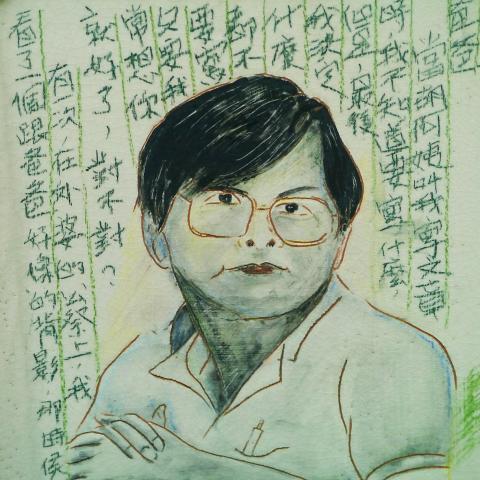An increasing number of young Taiwanese are taking an interest in the life and tragic end of Deng Nan-jung (鄭南榕), the executive director of the foundation named after the late democracy activist said yesterday on the 24th anniversary of Deng’s death by self-immolation.
The mood at the Deng Liberty Foundation, located on the recently renamed Freedom Lane in Taipei, was one of introspection as groups of people yesterday came to pay their respects to the former editor-in-chief of Freedom Era Weekly (自由時代週刊). Facing charges of sedition for his calls on the government to protect freedom of expression, Deng set himself ablaze in his office on April 7, 1989.
Ten years later, the same office, which by then had been turned into a human rights memorial hall, was opened to the public, showcasing a collection of photographs of Deng and other activists who fought for freedom in Taiwan under martial law. Hauntingly, Deng’s office remains as it was found after he committed the ultimate sacrifice, a reminder of a not-so-distant past.

Photo: J. Michael Cole, Taipei Times
Visitors yesterday honored the man by depositing red roses outside the charred room. A single white scarf, left behind by a Tibetan organization, graced the entrance to Deng’s study.
Addressing a group of several dozen visitors, foundation chief executive Tsao Chin-jung (曹欽榮) said he had observed in recent years a marked change in the interest among young people to learn more about Deng’s life and sacrifice.
He said the foundation was receiving more requests from students to visit it, to deepen their understanding of the man, whose Mainlander background had not diminished his commitment to Taiwan, as former president Chen Shui-bian (陳水扁), like Deng a former political prisoner, once said of him.
Thanks to the Internet and social media, interest in Deng’s life seems to be seeing a revival, Tsao said, adding that most young visitors today already had a fair understanding of Deng’s life and works.
Just as this correspondent was entering the memorial hall, he ran into Lin Fei-fan (林飛帆), a student leader who played a major role leading the anti-media monopoly movement against the attempted — now failed — acquisition of Next Media by a consortium that included Want Want China Times Group chairman Tsai Eng-meng (蔡衍明), whose close ties with the regime in Beijing have made him a controversial figure in the nation’s media environment.
Earlier in the day, Lin and several young activists had joined others during a ceremony at the Jinbaoshan Cemetery in New Taipei City (新北市) to honor Deng.
Young people have also sought other means to remember Deng. National Cheng Kung University’s 02 Group, whose members have pledged to continue to pursue the values that Deng sacrificed his life for, was scheduled to hold a candlelit vigil last night in memory of Deng.
Young Taiwanese were not the only ones who showed up to honor Deng. Following Tsao’s presentation at the foundation, a young Chinese student, who is studying at National Taiwan University, also made a brief speech.
Carrying a satchel he had just purchased from the foundation, the student said there were reasons to worry about Taiwan’s future, and he pointed to corruption within the Chinese Nationalist Party (KMT) as the main problem.

Chinese Nationalist Party (KMT) Chairman Eric Chu (朱立倫), spokeswoman Yang Chih-yu (楊智伃) and Legislator Hsieh Lung-chieh (謝龍介) would be summoned by police for questioning for leading an illegal assembly on Thursday evening last week, Minister of the Interior Liu Shyh-fang (劉世芳) said today. The three KMT officials led an assembly outside the Taipei City Prosecutors’ Office, a restricted area where public assembly is not allowed, protesting the questioning of several KMT staff and searches of KMT headquarters and offices in a recall petition forgery case. Chu, Yang and Hsieh are all suspected of contravening the Assembly and Parade Act (集會遊行法) by holding

PRAISE: Japanese visitor Takashi Kubota said the Taiwanese temple architecture images showcased in the AI Art Gallery were the most impressive displays he saw Taiwan does not have an official pavilion at the World Expo in Osaka, Japan, because of its diplomatic predicament, but the government-backed Tech World pavilion is drawing interest with its unique recreations of works by Taiwanese artists. The pavilion features an artificial intelligence (AI)-based art gallery showcasing works of famous Taiwanese artists from the Japanese colonial period using innovative technologies. Among its main simulated displays are Eastern gouache paintings by Chen Chin (陳進), Lin Yu-shan (林玉山) and Kuo Hsueh-hu (郭雪湖), who were the three young Taiwanese painters selected for the East Asian Painting exhibition in 1927. Gouache is a water-based

Taiwan would welcome the return of Honduras as a diplomatic ally if its next president decides to make such a move, Minister of Foreign Affairs Lin Chia-lung (林佳龍) said yesterday. “Of course, we would welcome Honduras if they want to restore diplomatic ties with Taiwan after their elections,” Lin said at a meeting of the legislature’s Foreign Affairs and National Defense Committee, when asked to comment on statements made by two of the three Honduran presidential candidates during the presidential campaign in the Central American country. Taiwan is paying close attention to the region as a whole in the wake of a

OFF-TARGET: More than 30,000 participants were expected to take part in the Games next month, but only 6,550 foreign and 19,400 Taiwanese athletes have registered Taipei city councilors yesterday blasted the organizers of next month’s World Masters Games over sudden timetable and venue changes, which they said have caused thousands of participants to back out of the international sporting event, among other organizational issues. They also cited visa delays and political interference by China as reasons many foreign athletes are requesting refunds for the event, to be held from May 17 to 30. Jointly organized by the Taipei and New Taipei City governments, the games have been rocked by numerous controversies since preparations began in 2020. Taipei City Councilor Lin Yen-feng (林延鳳) said yesterday that new measures by